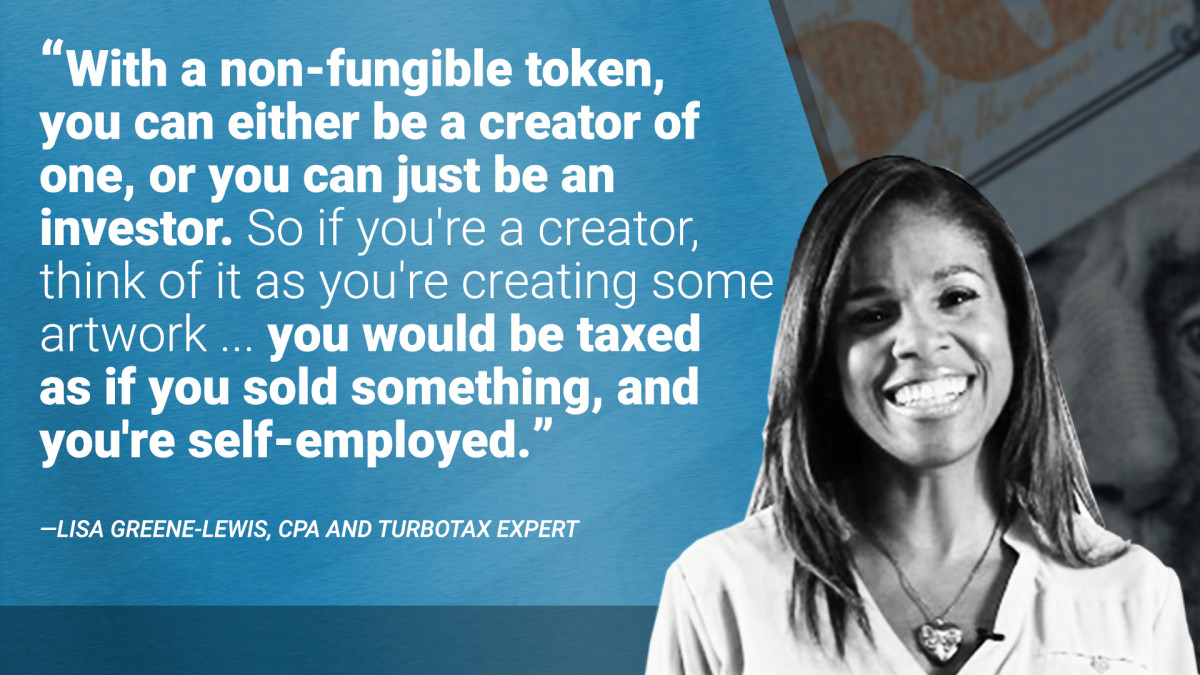The NFT marketplace exploded in 2021, generating over $23 billion in trading volume, according to blockchain analytics company DappRadar. That total was up from less than $100 million in the year prior.
And while the market has lost momentum, the IRS just cares if you made money or not. In the video above, Lisa Greene-Lewis, CPA and TurboTax expert explains NFTs, how taxes differ for investors compared to creators, and which forms are the right forms to use.
Quotes | NFT Tax Tips for Investors and Creators Lisa Greene-Lewis, CPA and TurboTax Expert Lisa Greene-Lewis, CPA and TurboTax ExpertRecommended: Crypto Tax Guide to Capital Gains and Losses
Video Transcript:Tracy Byrnes: So everyone is talking about NFTs these days. Heck, Gronk has an NFT. What is it? Is it taxable? The answer, most certainly, is yes. But how do we figure this out? Lisa Greene-Lewis, CPA and TurboTax (INTU) – Get Intuit Inc. Report expert, is here with us right now. OK, Lisa, first of all, what the heck is an NFT?
Lisa Greene-Lewis: It’s a non-fungible token, and its data is stored in a blockchain. And it can be either sold or traded.
Tracy Byrnes: Right. And many people will still say, huh? But that said, there are a lot of people investing in these things. And so no– I mean, it should just be assumed that if you’re buying and selling something, there are tax implications, right?
Lisa Greene-Lewis: Right. And with a non-fungible token, you can either be a creator of one, or you can just be an investor. So if you’re a creator, think of it as you’re creating some artwork. But it is a digital token in a blockchain, but it’s still artwork. So if you’re a creator, you would be taxed as if you sold something, and you’re self-employed.
Recommended Read: Sports Betting Taxes Guide (How to Pay Taxes on Sports Betting)
Tracy Byrnes: Right, so in theory, you got to pull out a Schedule C for this, don’t you, if you buy and sell these?
Lisa Greene-Lewis: Right. When you buy and sell these, you would receive a 1099-NEC report in your income. And you’re correct. It would go on the Schedule C, and you would also– I mean, you may have to pay self-employment taxes on that income.
Tracy Byrnes: Right. And so but it’s also like an investment, right? So then there are capital gains taxes as well?
Lisa Greene-Lewis: Right. So if you’re not a creator and you’re just investing in these NFTs, then you would pay capital gains just like a stock. And so you would either have long-term capital gains or short-term capital gains, depending on how long you held the NFT.
Tracy Byrnes: So that then would go on the Schedule D, right, the Capital Gains and Losses schedule?
Lisa Greene-Lewis: Yes.
Tracy Byrnes: This is crazy, but you have to follow the rules. And the IRS will come down and find you if money traded hands.
Lisa Greene-Lewis, thank you so much for taking the time.
Lisa Greene-Lewis: Thank you for having me.
Editor’s note: Video produced by TheStreet’s Zach Faulds
